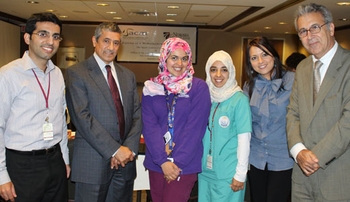It’s the genuine kindness in the people she’s met since coming to UNMC and The Nebraska Medical Center (TNMC) in January that impresses Nawar Alabdulqader the most.
“The people here are so nice, helpful and respectful,” said the medical technologist from King Fahd Specialist Hospital in Dammam, Saudi Arabia.
 |
From left: Hisham Bukhamseen, training in pharmacy; Mohammed Alomar, Ph.D., assistant cultural attache for academic affairs with the Saudi Arabian Cultural Mission; Mai Alshamlan, training in pathology; Nawar Alabdulqader, training in pathology; Dana El-Hajjar, a molecular lab technologist training in pathology; and Farid Awanes Tashjian, senior adviser of medical residency programs for the Saudi Arabian Cultural Mission. |
A special partnership
Nawar is one of 29 health care providers from Saudi Arabia who received training through a program developed by Nizar Mamdani, executive director of International Healthcare Services at The Nebraska Medical Center.
She was able to come to Omaha through the International Strategic Partnership training program. The program has helped more than 147 health care professionals learn from medical experts at The Nebraska Medical Center and UNMC faculty.
Since January, Nawar has honed her skills in medical technology and molecular diagnostics. Before she leaves this month, Nawar will take the membership exam for the American Society of Pathology.
Program lauded
The success of the program was recognized at a recent luncheon where Mamdani signed a memorandum of understanding with representatives from the Saudi Arabian Cultural Mission, Mohammed A. Alomar, Ph.D., assistant cultural attache for academic affairs, and Farid Awanes Tashjian, senior adviser of medical residency programs.
The approach to customized international health care professional training and education is designed to give international organizations a competitive edge and improve patient outcomes at these institutions.
A new perspective
For Nawar the experience has not only enhanced her medical training, but given her new insight into American culture and Midwestern hospitality.
“Everything I’ve learned, the techniques, teamwork and exceptional quality, I will take back and pass along to others at my hospital,” she said.